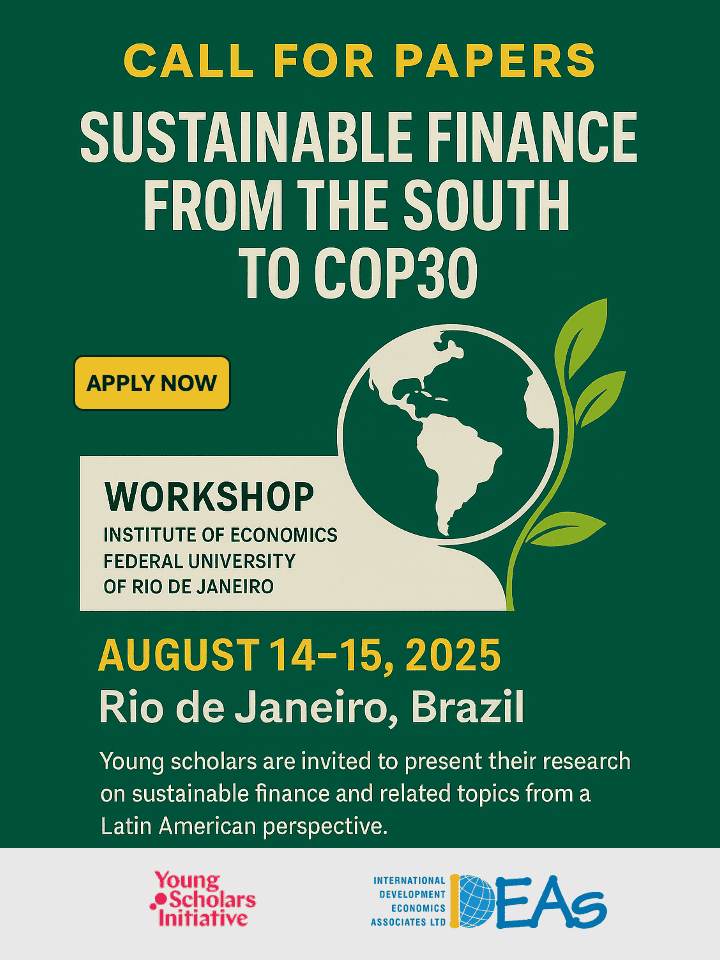Apply now: https://heske.wisdmlabs.net/event/sustainable-finance-from-the-south-to-cop30/2025-08-14/
In recent studies, ECLAC has identified three development gaps for Latin America: environmental, social and external. This region is characterized by being socially unequal, macroeconomically conditioned by the dynamics of the external sector (through commercial and financial channels) and with growing challenges in terms of the protection of its biodiversity and natural resources.
The proposals to attack the three gaps through the financing of climate change protection, mitigation and adaptation activities, as well as the necessary energy transition, focus on the issuance of environmental, social and governance (ESG) bonds, both corporate and sovereign; as well as different Debt Exchange (CD) mechanisms, especially by nature or in exchange for environmental services.
The growth and development of these tools in recent years at the global and Latin American level make them an important issue to achieve the United Nations Sustainable Development Goals. However, some studies warn about the ineffectiveness of ESG bonds and Debt-for-Nature Swaps, in a scenario where the international financial architecture is characterized by asymmetric relationships, where many countries in the Global South face conditions in their economic policies as a result of their subordinate position in international monetary hierarchies (and therefore have limited fiscal space). Likewise, if the energy transition involves importing technologies from central countries, the external gap can be exacerbated and the dependence of the countries of the region can intensify. While the limited fiscal space of peripheral economies as a result of their productive conditions, monetary hierarchies, and institutional norms (fiscal rules) limit the potential of local governments to carry out their role as dynamizers of the economic and social transformations that this era demands.
These debates take place in a context of redefinitions in geopolitics, which entail growing uncertainty in environmental issues. The U.S. left the Paris Agreement, while China has become the world leader in investments in renewable energy, sustainable mobility, and transition technologies. It has also intensified investments in this area in the region, as well as in strategic minerals necessary for this purpose.
This workshop, organized by the YSI working group in Latin America, the Centre for Sustainable Finance at UFRJ, the IDEAs network, and supported by the Center for Sustainable Finance (CEFIS/IE-UFRJ), the Finance and Development Research Group (FINDE/UFF), the Electric Energy Studies Group (GESEL/UFRJ), CORECON (Regional Council of Economics of Brazil), Latindadd (Latin American and Caribbean Network for Economic, Social and Climate Justice), and Oxfam. This space, therefore, aims to develop activities that facilitate discussion of the various dimensions of these initiatives from a Latin American perspective.
Youg scholars will present their work in progress in sessions during August 14th, they will receive feedback and there will be sessions with experts and policy makers during August 15th.
There will be sessions with experts and instances of research presentation for young researchers. It is planned to produce material that is relevant to policymakers towards COP30 to be held in Brazil in November.
How to attend
Young researchers (Master and PhD students and early PhD scholars-less than 3 years from PhD completion) are invited to submit proposals that include topics such as:
- ESG bonds,
- financial subordination in Latin America,
- financing and geopolitics of the energy transition,
- sustainable finance,
- proposals for Latin America towards COP30,
- other related topics.
Submissions: Interested scholars are invited to apply to the workshop by submitting a short preliminary article (4.000 -5000 words). The major prerequisites for acceptance are completeness and relatedness to the required topics. Submitted work will most likely be considered if it is fully readable and does not lack substantial sections. We encourage authors to send their articles in English, Portuguese or Spanish. To apply, you must have an active YSI profile.
Workshop presentations: In the workshop, mentors will give feedback to the participants. The workshop will be organized in different sessions according to the research topic.
Financial support: is available, although resources are scarce. In this sense, partial support can only be given to scholars who are based in the region. Please indicate the need for funding in the application. In case of acceptance, organizers will contact details about the amount granted.
Important dates
Reception of short articles (4000-5000 words): 14th July 2025
Acceptance announcement: 16th July 2025
Workshop: August 14-15, 2025
Apply now: https://heske.wisdmlabs.net/event/sustainable-finance-from-the-south-to-cop30/2025-08-14/

